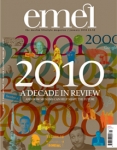
Getting what we deserve
Issue 64 January 2010
In an age of growing consumerism, the lines between desire, demand and deserve have become blurred.
This morning I received an email entitled Apply for your Diploma, with this message:
“BECAUSE YOU DESERVE IT! Is your lack of a degree holding you back from career advancement? Are you having difficulty finding employment in your field of interest because you don’t have the paper to back it up – even though you are qualified? If you are looking for a fast and effective solution, we can help! Call us right now for your customized diploma.” There followed telephone contact numbers for inside and outside the U.S.A.
What struck me about this invitation was not the existence of outfits selling diplomas and degrees, for they have been around for quite a while, especially in the USA, nor the speed with which they promise to deliver your piece of paper (often within 24 hours), but the language of pseudo-worthiness and narcissism designed to ensnare potential clients. BECAUSE YOU DESERVE IT! is a thinly disguised variant of the trademark motto of the French cosmetics giant L’Oréal: YOU’RE WORTH IT. There is a long-standing association between the senses of ‘deserve’ and ‘being worthy’ in English, but the original sense of the Latin was to ‘serve well’ and to become entitled to praise, esteem or reward through meritorious service. How utterly remote from this exalted conception of worthiness is the deluded fiction that we are deserving of something solely and simply because we desire and demand it, and, what’s more, we deserve to get whatever we want (and more) now, this instant, and before anyone else can get their hands on it.
In a previous essay for this magazine (“Of Stones and Glasshouses: The Pursuit of Forgetfulness”, February 2008 issue) I drew attention to the pervasive culture of narcissism which thrives in our consumer society. Walking through Bath a few days before Christmas two years ago, I could not fail to notice a large poster in the window of a hairdressing salon in the heart of the city. In the centre of the poster was a glitzy handbag surrounded by various vanity products with the caption ghd Christmas Giftbox. Above, in bold letters, the message was a blatant and insolent parody of the language of Christian supplication: Grant me the Power to be the Centre of Attention this Christmas, with the added blasphemy of a direct citation of words from the Lord’s Prayer, the Christian equivalent of the Muslim Fatiha: Thy Will be Done. And at the foot of the poster, these words: A New Religion, ghd Hair.
It was Christopher Lasch who used the phrase The Culture of Narcissism as the title of his influential 1979 book describing how life in America was increasingly in thrall to self-absorption and self-gratification – how, in effect, we were falling in love with ourselves. His prophetic observations apply equally, of course, to our own consumer society.
Narcissism is named after the ancient Greek myth of Narcissus, a handsome youth who rejected the desperate advances of the nymph Echo. In punishment for his cruelty, he was doomed to fall in love with his own reflection in a pool of water. Unable to consummate his love, he pined away and changed into the flower that bears his name to this very day.
One of the characteristics of pathological narcissism, along with arrogance and envy, is ‘entitlement’, the unreasonable expectation held by narcissists that they deserve particularly favourable treatment and automatic compliance because they consider themselves uniquely special. Failure to comply is considered an attack on their superiority and can trigger narcissistic rage. We might reasonably associate such extreme complexes and reactions with dysfunctional narcissistic personality disorders, but there is a sense also in which such disorders can infect a whole society and culture. We can see, for example, some degree of the pathological belief in ‘entitlement’ in the seductive slogan that we are ‘worth it’, or deserving of something not because we have earned it, but solely and simply because we desire and demand it.
Two weeks ago I spent some time in Birmingham City Centre before going to the airport to catch a flight to Berlin for the launch of the German translation of The Message of the Qur’an. I noticed a glitzy store called BRATZ, selling designer childrenswear and sporting the prominent motto GET THEM WHAT THEY WANT. To my mind, there was something profoundly perverse about this message, at once insolent and painfully sad.
The word ‘brat’ has long been a derogatory word for a rough and ill-mannered child, and ironically it probably derives from the English dialect word brat, ‘makeshift or ragged garment’. A poor child might well have worn ragged garments in the past, and might not have learned many social graces, but these disadvantages would have entailed no necessary defects of character. Today, children can wear designer clothes from BRATZ, and know that their parents will GET THEM WHAT THEY WANT. To be a modern brat becomes a badge of honour in a society in which the acquisition of fashionable material goods becomes the sole criterion of superior status, but the brat is no longer the poor child with ragged clothes, but the well-off child with the swanky clothes who is encouraged to believe that he deserves to get whatever he wants.
So what does the Qur’an tell us about our ‘entitlement’ as human beings? I have to say that my own reading of the Qur’an has not conveyed to me any conspicuous or abiding sense of what I am ‘entitled’ to or ‘deserve’ automatically as a result of my status as a human being, but rather it continually reminds me of the pressing and ultimately inescapable responsibility that status confers upon me. It tells me that the doctrine of the primordial Covenant (mithaq) between God and mankind (Qur’an 7:172-3) implies an absolute sacred Trust (amanah) which imposes on us the duty of stewardship (khilafah) and demands of us a proactive sense of social responsibility, charitable deeds, and good works (salihat).
Muhammad Asad notes that the term ‘aqd (“covenant”) in the Qur’anic call to people of faith to be “true to your covenants” (Qur’an 5:1) denotes a “solemn undertaking involving more than one party” and he refers to Raghib’s interpretation that “the covenants referred to in this verse are of three kinds: the covenants between God and man, between man and his own soul, and between the individual and his fellow-men, thus embracing the entire area of man’s moral and social responsibilities.” Since man had the temerity to assume the Trust through his own free will, he must continually strive to measure up to the moral responsibility demanded of him by his acceptance of that self-imposed burden.
Furthermore, the Qur’an urges us to restrain our inordinate personal desires and bear witness to our higher calling: And every human being will come forward with his erstwhile inner urges and his conscious mind, and will be told: “indeed, unmindful hast thou been of this Day of Judgement; but now We have lifted from thee thy veil, and sharp is thy sight today!” (Qur’an 50:21-22).
To paraphrase Muhammad Asad’s detailed note on these verses, they refer to the contending nature of the two fundamental motive forces within man: on one side, that which drives (sa’iq), our primal, instinctive urges, inordinate appetites and unrestrained desires (often symbolized as shaytan), and on the other side, our conscious reason (shahid), both intuitive and reflective, or the awakening of the deeper layers of our consciousness, the “lifting of the veil” that leads to a sudden and striking perception of our own moral reality.
We have already observed how the original Latin sense of the English word ‘deserve’ is related to the imperative of service to others - to ‘serve well ’ and to become entitled to praise, esteem or reward through meritorious service. But it has always seemed to me that the essence of the Qur’anic vision of service goes beyond the promise of reward and the entitlement to praise or esteem, even that which is justly earned through altruism.
True, the Qur’an promises divine rewards for those who have faith and do good works, but the ideal spiritual attitude must surely be to go beyond either fear of divine wrath or hope of divine reward and to love what is good purely for its own sake. The insistence that one’s spiritual aspiration should be based in selfless love is most famously expressed by the great woman mystic Rabi’a al-Adawiyya, who lived in Basra in the first century after the death of the Prophet: “O Allah! If I worship Thee in fear of Hell, burn me in Hell; and if I worship Thee in hope of Paradise, exclude me from Paradise; but if I worship Thee for Thine own sake, withhold not Thine Everlasting Beauty!”
Bookmark this |
|
Add to DIGG |
|
Add to del.icio.us |
|
Stumble this |
|
Share on Facebook |
|
Share this |
|
Send to a Friend |
|
Link to this |
|
Printer Friendly |
|
Print in plain text |
|


Comments
0 Comments